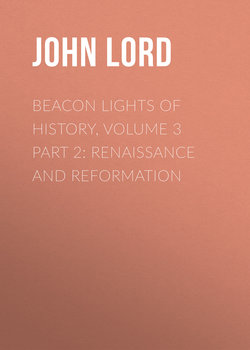Beacon Lights of History, Volume 3 part 2: Renaissance and Reformation

Реклама. ООО «ЛитРес», ИНН: 7719571260.
Оглавление
John Lord. Beacon Lights of History, Volume 3 part 2: Renaissance and Reformation
DANTE. A.D. 1265-1321. RISE OF MODERN POETRY
GEOFFREY CHAUCER. A.D. 1340-1400. ENGLISH LIFE IN THE FOURTEENTH CENTURY
CHRISTOPHER COLUMBUS. A.D. 1446-1506. MARITIME DISCOVERIES
SAVONAROLA. A. D. 1452-1498. UNSUCCESSFUL REFORMS
MICHAEL ANGELO. A.D. 1475-1564. THE REVIVAL OF ART
MARTIN LUTHER. A. D. 1483-1546. THE PROTESTANT REFORMATION
THOMAS CRANMER. A. D. 1489-1556. THE ENGLISH REFORMATION
IGNATIUS LOYOLA. A.D. 1491-1556. RISE AND INFLUENCE OF THE JESUITS
JOHN CALVIN. A. D. 1509-1564. PROTESTANT THEOLOGY
FRANCIS BACON. A. D. 1561-1626. THE NEW PHILOSOPHY
GALILEO. A. D. 1564-1642. ASTRONOMICAL DISCOVERIES
Отрывок из книги
The age which produced Chaucer was a transition period from the Middle Ages to modern times, midway between Dante and Michael Angelo. Chaucer was the contemporary of Wyclif, with whom the Middle Ages may appropriately be said to close, or modern history to begin.
The fourteenth century is interesting for the awakening, especially in Italy, of literature and art; for the wars between the French and English, and the English and the Scots; for the rivalry between the Italian republics; for the efforts of Rienzi to establish popular freedom at Rome; for the insurrection of the Flemish weavers, under the Van Arteveldes, against their feudal oppressors; for the terrible "Jacquerie" in Paris; for the insurrection of Wat Tyler in England; for the Swiss confederation; for a schism in the Church when the popes retired to Avignon; for the aggrandizement of the Visconti at Milan and the Medici at Florence; for incipient religious reforms under Wyclif in England and John Huss in Bohemia; for the foundation of new colleges at Oxford and Cambridge; for the establishment of guilds in London; for the exploration of distant countries; for the dreadful pestilence which swept over Europe, known in England as the Black Death; for the development of modern languages by the poets; and for the rise of the English House of Commons as a great constitutional power.
.....
He was a sheriff, also, to enforce the law, and to be present at all the county sessions. The doctor, of course, could not be left out of the company,—a man who knew the cause of every malady, versed in magic as well as physic, and grounded also in astronomy; who held that gold is the best of cordials, and knew how to keep what he gained; not luxurious in his diet, but careful what he ate and drank. The village miller is not forgotten in this motley crowd,—rough, brutal, drunken, big and brawn, with a red beard and a wart on his nose, and a mouth as wide as a furnace, a reveller and a jangler, accustomed to take toll thrice, and given to all the sins that then abounded. He is the most repulsive figure in the crowd, both vulgar and wicked. In contrast with him is the reve, or steward, of a lordly house,—a slender, choleric man, feared by servants and gamekeepers, yet in favor with his lord, since he always had money to lend, although it belonged to his master; an adroit agent and manager, who so complicated his accounts that no auditor could unravel them or any person bring him in arrears. He rode a fine dappled-gray stallion, wore a long blue overcoat, and carried a rusty sword,—evidently a proud and prosperous man. With a monk and friar, the picture would be incomplete without a pardoner, or seller of indulgences, with yellow hair and smooth face, loaded with a pillow-case of relics and pieces of the true cross, of which there were probably cartloads in every country in Europe, and of which there was an inexhaustible supply. This sleek and gentle pedler of indulgences rode side by side with a repulsive officer of the Church, with a fiery red face, of whom children were afraid, fond of garlic and onions and strong wine, and speaking only Latin law-terms when he was drunk, but withal a good fellow, abating his lewdness and drunkenness. In contrast with the pardoner and "sompnour" we see the poor parson, full of goodness, charity, and love,—a true shepherd and no mercenary, who waited upon no pomp and sought no worldly gains, happy only in the virtues which he both taught and lived. Some think that Chaucer had in view the learned Wyclif when he described the most interesting character of the whole group. With him was a ploughman, his brother, as good and pious as he, living in peace with all the world, paying tithes cheerfully, laborious and conscientious, the forerunner of the Puritan yeoman.
Of this motley company of pilgrims, I have already spoken of the prioress,—a woman of high position. In contrast with her is the wife of Bath, who has travelled extensively, even to Jerusalem and Rome; charitable, kind-hearted, jolly, and talkative, but bold and masculine and coarse, with a red face and red stockings, and a hat as big as a shield, and sharp spurs on her feet, indicating that she sat on her ambler like a man.
.....